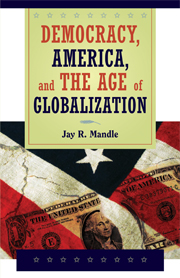7 - Organizing for Democracy
Published online by Cambridge University Press: 14 May 2010
Summary
The people of the United States have not adequately come to terms with the social and economic changes of the past thirty years. Globalization and computerization have been responsible for increased domestic income inequality. A plurality of Americans tells poll takers that they would like to see this trend offset and that the government should act to achieve greater equality. But the polling data also reveal widespread belief that the political system is rigged on behalf of the rich and that it is the elite who benefit from government initiatives. As a result, the public has not mobilized on behalf of redistributive programs, and the issue of inequality remains largely absent from the country's political agenda.
This lack of trust in the government, as Marc J. Hetherington points out, is “generally good news for those on the political right.” As he puts it, “a low trust environment is … advantageous for those who want government to do less.” Since the right, he goes on, “opposes federal efforts at redistribution and extensions of the social safety net … widespread political distrust aids these causes.” Even so, Hetherington suggests that conservatives in general and Republicans in particular must take into account the latent support that persists for such programs. He goes so far as to maintain that “it is unclear whether conservative Republicans can continue to dominate the national government in the face of this opinion.”
- Type
- Chapter
- Information
- Democracy, America, and the Age of Globalization , pp. 131 - 150Publisher: Cambridge University PressPrint publication year: 2007

